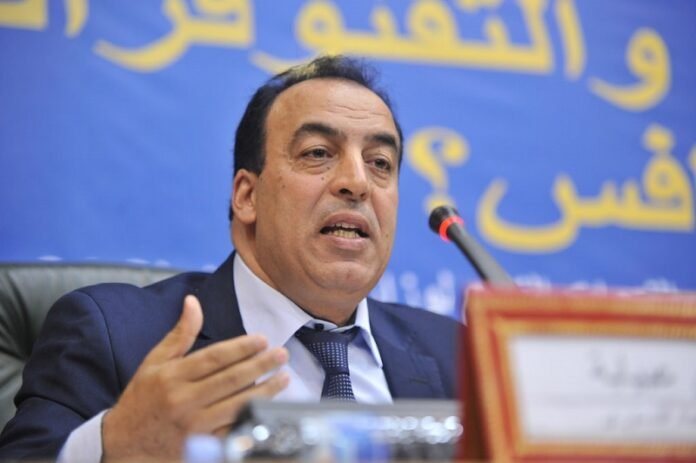In his latest article titled “The Future of the Government Between the Electoral and Constitutional Contexts”, Dr. El Hassan Abiaba, former minister and president of the Ibn Battuta Center for Scientific and Strategic Studies and Research, offers a deep analysis of the performance of the current Moroccan government and its future in light of the political, economic, and social challenges facing the country. Abiaba relies on a balanced reading of electoral and constitutional legitimacy, while highlighting the failures hindering the implementation of the government program and raising essential questions about the future of Morocco’s political landscape.
General Context: The Failures of the Government Program and the Loss of Credibility
Abiaba begins his analysis by noting that the current government emerged from the unified legislative and communal elections of September 2021, described as “transparent and fair.” These elections granted the government electoral legitimacy, but it failed to achieve the economic and social indicators it had set in its program, particularly regarding the construction of the “social state.”
A central question arises here: Why did the government fail to achieve its objectives despite its electoral legitimacy? Abiaba attributes this failure to several factors, including:
- Lack of Significant Economic Growth: The government failed to generate notable economic growth, hindering the promised development.
- Failure to Build the Social State: Abiaba believes this issue was not sufficiently studied from financial and social perspectives.
- Rising Unemployment: The unemployment rate exceeded 21% according to 2024 statistics, reflecting the government’s failure to create jobs.
- Bankruptcy of SMEs: Thousands of small and medium-sized enterprises, representing over 80% of the national economic fabric, went bankrupt, worsening the economic crisis.
- Increased Cost of Living: Purchasing power significantly declined, exacerbating poverty and deepening social inequalities.
Based on these indicators, Abiaba concludes that the government program is now “incapable” of achieving its remaining goals, calling into question the government’s future.
Electoral Legitimacy: Between Lost Credibility and Political Reality
Abiaba emphasizes that the current government relies on two legitimacies: electoral legitimacy and constitutional legitimacy. Regarding electoral legitimacy, he notes that the government acquired it through Parliament and not directly from citizens. However, this legitimacy has lost credibility among voters due to the aforementioned failures.
A crucial question arises here: Can the government maintain its electoral legitimacy in the face of declining public trust? The answer seems negative, especially in a context of growing discontent and declining government performance indicators.
Constitutional Legitimacy: Between Royal Intervention and Parliamentary Majority
Regarding constitutional legitimacy, Abiaba explains that it depends on the Parliament’s vote on the government program and the appointment of the government by His Majesty the King. However, he observes that the formation of the government is subject to political rather than electoral considerations, with the head of government choosing the parties that will form the governing coalition without directly considering the voters’ will.
This reality raises another question: Can the government be considered a true representative of the voters’ will within this constitutional framework? For Abiaba, the answer lies in the nature of the Moroccan political system, which combines electoral and constitutional legitimacy but leaves ample room for political intervention outside elections.
The Future of the Government: Between Continuity and Change
In the final part of his article, Abiaba explores possible scenarios for the government’s future, arguing that its continuation in the current context of failures could exacerbate political and social crises. He warns that the next elections could turn into a “political conflict” rather than an “electoral competition,” especially with the potential entry of radical political actors seeking to exploit the situation for their own goals.
Abiaba also criticizes the phenomenon of “electoral appendices,” where the ruling majority treats other parties as electoral tools it controls. This situation, he argues, threatens to undermine democracy and fairness among parties.
A Technocratic Government: Solution or Complication?
In conclusion, Abiaba proposes the formation of a technocratic government to manage the next phase, believing that this model could be more effective in overcoming internal issues and completing royal projects. He also calls for a new national mobilization to address external challenges and create conditions conducive to elections that ensure equal opportunities and fair competition.
A final question arises here: Can a technocratic government be the optimal solution to current challenges? The answer seems positive in a context of declining trust in traditional political parties, but it remains tied to the need to ensure broad democratic participation and transparency in the formation process.
Conclusion: Toward a More Stable Democratic Future
Dr. El Hassan Abiaba concludes that the future of the Moroccan government depends on its ability to restore public credibility and achieve tangible accomplishments. In light of current failures, a change in the government’s composition or early elections may be necessary to restore trust and rebuild the political landscape.
But the most important question remains: Can the Moroccan political system overcome these crises and build a more stable democratic future? The answer to this question will determine the fate of Morocco’s democratic experience in the coming years.


